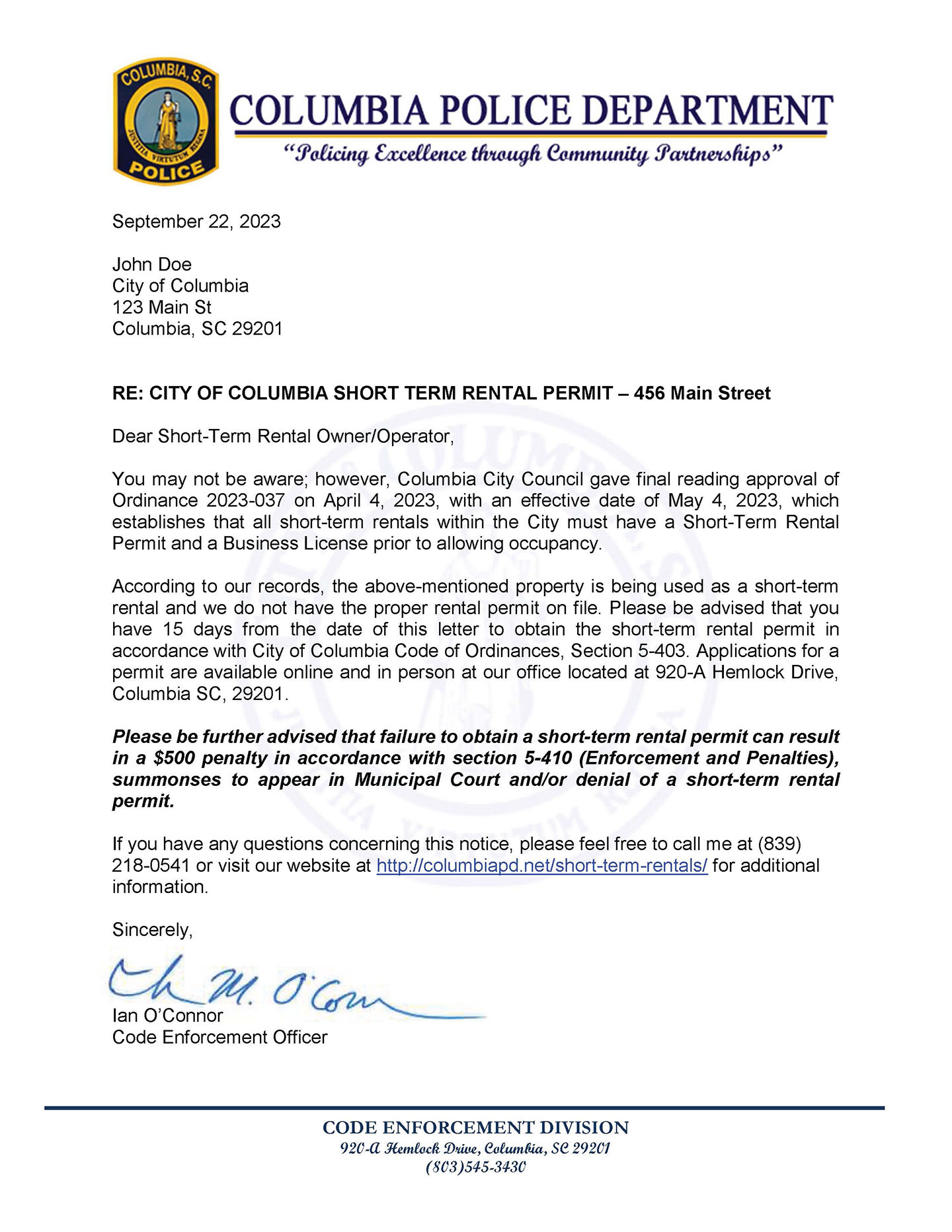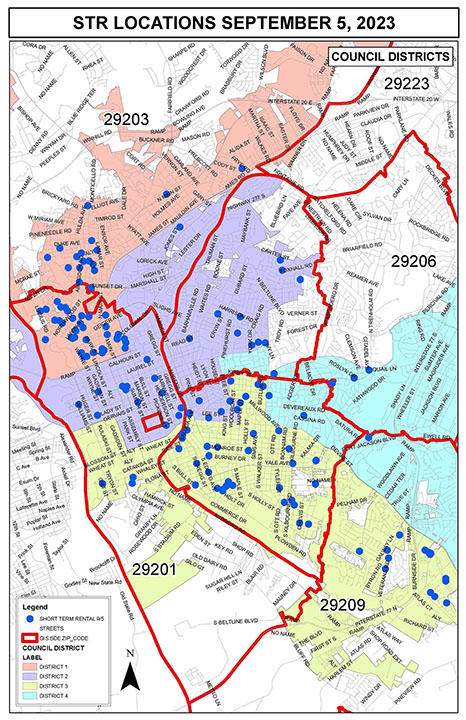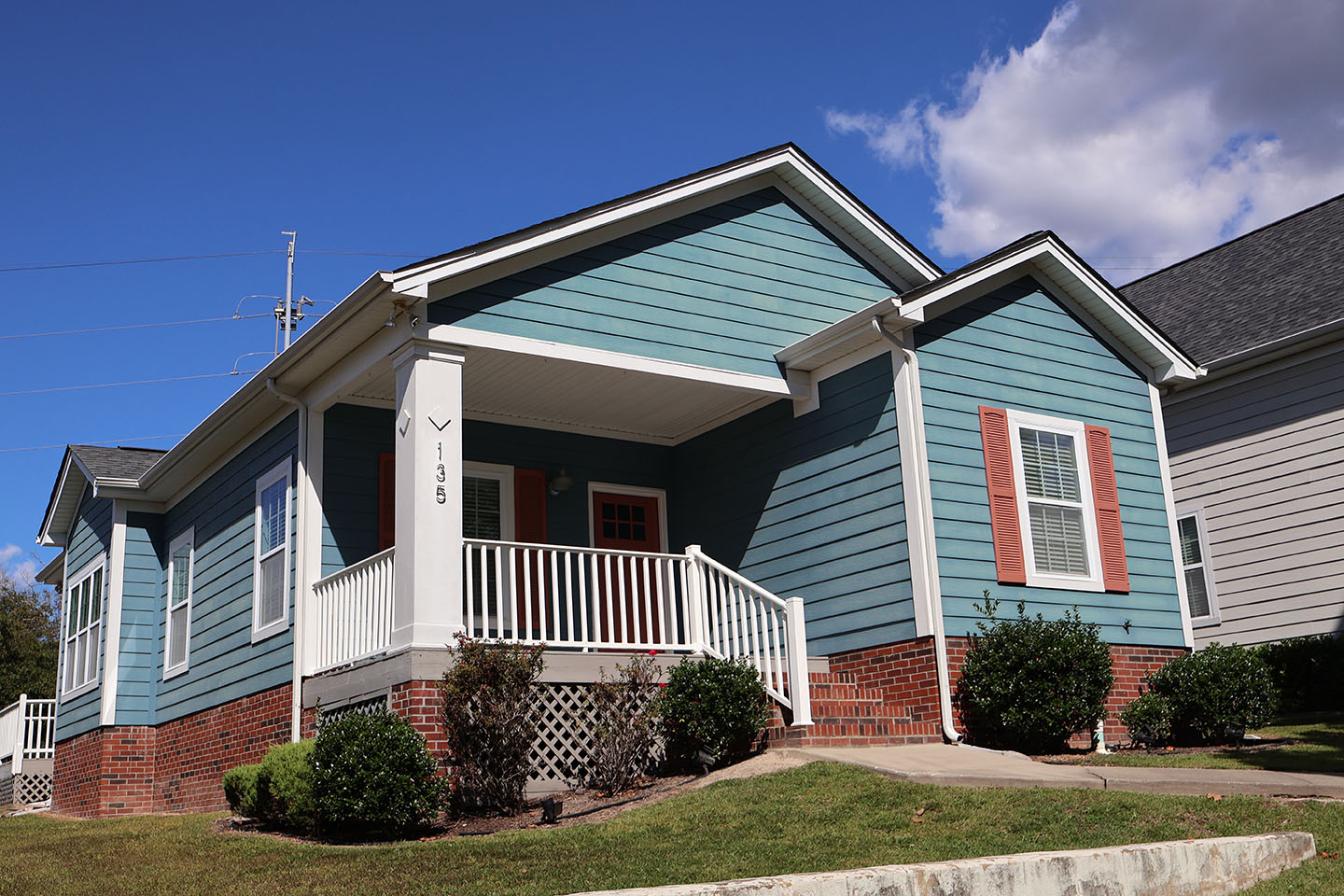A home advertised as an Airbnb near the University of South Carolina in downtown Columbia (Photo by Camdyn Bruce/Carolina News and Reporter)
Columbia last month started requiring homeowners to get a permit and business license before renting their homes short term, such as through Airbnb.
Since then, the city has warned hundreds of people they’re violating the law.
Kit Smith, vice president of the Wales Garden Neighborhood Association, said an excess of Airbnbs concentrating downtown can negatively impact the stability of a neighborhood.
“Most people don’t understand it until one comes in right next to them or right behind them,” Smith said. “It’s hard to find anybody that says ‘Yes, I’d love to have one next door to me.'”
Trash, noise, parties and raucous football tailgating are all things Columbia City Council heard complaints about before passing the regulations. Quality of life is an issue for neighborhoods. And Columbia wants to keep homeowners happy about living downtown.
City Council passed an ordinance April 4 requiring hosts to get permits for each individual property operating as a short-term rental.
Columbia Codes Enforcement has notified at least 214 short-term rental hosts, including those operated through Airbnb or VRBO, that they’re out of compliance. Some of those, officials found through ads placed on short-term rental websites.
By the Sept. 4 deadline, 194 short-term rentals had obtained the proper permits.
Hosts out of compliance received a letter of notification from Codes Enforcement, giving them 15 days to obtain the proper permits or face a fine of up to $500. No one has been fined yet.
Rentals continuing to operate without a permit after being fined will be criminally charged for running an illegal business, and the case will likely appear in municipal court, Codes Enforcement housing official David Hatcher told the Carolina News and Reporter through an email.
Are the number of short-term rentals in the city going down?
Citywide Councilman Howard Duvall said many of the 214 hosts notified have already taken steps to comply.
“We are in our first month now, a little past the first months of permitting, and we’re getting close to 300 permits so far,” Duvall said.
As of Oct. 23, there were 280 legally permitted short-term rentals in Columbia, Hatcher said.
Before the new regulations took effect, Hatcher’s office told City Council there were about 600 Airbnb-style units in the city.
So Duvall said he had expected about 500 rentals to apply for the new permits.
“Some of the people that were operating on the short-term rental (market), decided it was probably in their best interest to operate as a long-term rental,” Duvall said.
Simply put, the permit is cheaper.
Hatcher said Duvall might be right.
Hatcher said 107 new long-term rental permit applications, including for hotels and apartments, have been submitted since May, resulting “in the addition of 2,352 rental units.”
To be a long-term rental, a property must host guests for a minimum of 30 days. The cost of a long-term rental permit is $25 a year. Short-term rental permits range between $100 to $250, depending on the type of property.
Ben Johnson works as a local host for a company renting short- and longterm properties in Columbia. He said another reason there are fewer Airbnb rentals is because many businesses have started buying properties outside the city in recent years, fearing a ban.
“We had a business partner. Bought a house. Gutted it. … Spent a lot of money on it,” Johnson said. “Then they came out and started talking about, ‘Oh, we’re gonna restrict Airbnbs, … and our partner kind of freaked out, and so we ended up selling the house.”
Johnson said it was the last house the company purchased in Columbia.
“Since then, we’ve bought a place on Lake Wateree and are looking in some other areas outside the city limits,” Johnson said.
Codes Enforcement is still in the process of locating rentals not abiding by the ordinance.
In addition to requiring permits, the new regulations require short-term rentals to provide two parking spaces for guests. The ordinance also requires hosts or a local representative for the rental to provide their contact information to all adjacent property owners.
The new rules also create a point system for rentals that disturb neighborhood residents or break city laws – like the rules for regular rental units. Hosts who accumulate 15 points within a year would have their permits revoked.
Neighborhood residents are still skeptical
Many residents still think the new regulations don’t go far enough to protect neighborhoods.
Smith said she fears short-term rentals populating residential areas will drive up housing costs.
“This has an impact on affordable housing,” Smith said. “You get too many of those on one street, or within a couple blocks of each other, the prices go up because people want to buy them for rental property for commercial uses rather than for family uses.”
Danielle Shealy lives in the Elmwood Park neighborhood next to a long-term rental previously used as short-term rental through Airbnb. So while the purchase of a property for an Airbnb took homes off the homeownership market, as Smith said, the conversion from Airbnbs to long-term rentals has provided opportunities for renters in neighborhoods they maybe couldn’t afford before. She said before the conversion, someone would’ve needed to buy a $500,000 home to move into her neighborhood.
“All of the Airbnb rentals in my neighborhood were the entry-level homes,” Shealy said. “I think it was really locking out a lot of these entry-level people from either purchasing or renting.”
Smith and other neighborhood residents asked City Council for a temporary moratorium on new short-term rentals and a cap on the number allowed to operate within city limits when the council debated the issue in April.
Neither request successfully made it into the ordinance.
David Bergmann, who runs the local Heartwood Furnished Homes rental company, said demand for short-term rentals was down post-pandemic, so stronger regulations would’ve been unnecessary.
“The amount of rentals is actually going down right now, as simply the demand for rentals is not there,” Bergmann said. “I think supply and demand tends to be a better control than regulation that puts hard caps, and we’ve seen that play out so far this year.”
Bergmann also said short-term rentals constitute a very small percentage of the housing supply and don’t take away opportunities for buyers in most neighborhoods.
“I think it’s fewer than 1,000 out of 50,000 or 60,0000 residences in the Columbia area,” Bergmann said. “So, it wasn’t a significant portion.”
Residents also have raised concerns about short-term rental hosts not being held accountable for the misbehavior of guests in the past.
“There’ve been a lot of parties,” Smith said. “There was a shooting at one in Rosewood. And the biggest problem is you don’t know who you’re going to get.”
Bergmann said he thinks the new regulations will allow Codes Enforcement to weed out party houses.
“You got bad actors who are not running their rentals the right way,” he said. “They know that they can’t come forward and get permits.”
Those folks kind of give a bad name to short-term rentals, Bergmann said.
“Frankly, these are the ones that the neighbors are complaining about,” he said.
For others, it’s a question of what the composition of their neighborhood should be.
Shealy, who has lived next to a long-term and short-term rental, said she prefers having more permanent neighbors.
“We like it a lot more,” Shealy said. “We know the neighbors. … To never know who is next door to you is just very uncomfortable.”
Gabrielle Burt lives next to an Airbnb not far from the University of South Carolina. She said she doesn’t mind the revolving door of neighbors.
“They don’t bother me at all,” Burt said. “I don’t have any personal issues.”
Tax requirements for short-term rentals also have emerged as an issue since the permitting deadline.
Bergmann said rentals operating without permits are evading monthly taxes to the city.
“There is a tourism development fee that we’re paying that’s 3% of our booking revenue, and those folks are not paying that 3%,” Bergmann said.
Duvall is stepping down from City Council after this year but said he thinks the new regulations are an improvement.
“I do think we took a step in the right direction,” he said.
The notification letter sent by Columbia Codes Enforcement to short-term rental hosts the city identified as out of compliance with new permitting requirements. (Provided by Columbia Codes Enforcement/Carolina News and Reporter)
A map showing the location of every legally permitted short-term rental in Columbia on Sept. 5 of this year, the day after the permitting deadline. (Map provided by Columbia Codes Enforcement/Carolina News and Reporter)
A home being advertised as an Airbnb in a downtown Columbia neighborhood (Photo by Camdyn Bruce/Carolina News and Reporter)





